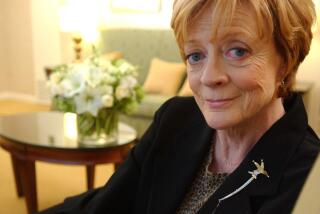The key to ‘Downton Abbey’s’ jump to the big screen? A bold vision to hang it on
- Share via
The story of how “Downton Abbey” began, 10 years ago, is too familiar to need retelling here, so I’ll skip to the moment when Peter Fincham gave the green light and welcomed us to ITV. Nothing prepared us for the impact that the show made. We were proud of it and confident it would find its audience, I know I was, but we seemed to be part of something larger than that almost immediately, and when America joined it became fairly surreal.
I’d appeared in popular shows when I was an actor, I’d written some hit movies, a couple of bestsellers and a Broadway show, but nothing prepared me for “Downton” fever. One woman even burst into tears in the middle of Barnes & Noble in New York, because I had not made Edith Crawley happy. I’m sure this sort of thing has happened before, when “Mad Men” was going out, or “Game of Thrones” or “The West Wing.” But it had never happened to me, and I found it extraordinary.
The years rolled on, taking the show round the world, gaining a following from China to Uganda, and we rolled with it, mainly to Los Angeles, where we would go for awards dinners and publicity tours, with all the actors increasingly famous, until we reached the sixth season and the general feeling emerged that it was time to stop.
The younger actors wanted to explore their place in the industry, which seemed reasonable, and so I wrote the last season with a final episode that was not, for once, aimed at a wider audience, but instead it was written for the supporters of the show, finally making Edith happy (as I had promised) and generally bringing matters to a satisfactory close. I wrote “THE END” and we all went to the Ivy Club, where everyone wept and drank too much and that, I thought anyway, was that.
So how did the movie come about? Well, it was born in producer Gareth Neame’s brain before it took root in mine. I was not convinced that a show had to finish with a movie. “Mad Men” didn’t. “The West Wing” didn’t. And I couldn’t believe we’d gather all the actors together. But gradually it came to pass, largely through Gareth’s tenacity and the cast’s eagerness, that the difficulties should be overcome.
But what should the film consist of? Should it be a breakaway story, with all the characters in some entirely new setting, facing entirely new challenges, or should it be a bigger, brighter, bolder version of the show? I was a keen supporter of the second option and I was looking for a theme that would give us opportunities to demonstrate “Downton” at its best. This came to me when I was reading “Black Diamonds” by Catherine Bailey, with its description of the visit King George V and Queen Mary made to Yorkshire in 1912.
In our story, they would do the same 15 years later. And it would give us the chance to show parades and balls and banquets with a splendor that had never been quite possible on the television screen. The house itself would step up to the mark and look more impressive than ever before.
It wasn’t all plain sailing; we had dramas to contend with. Harry Hadden-Paton was playing Professor Higgins on Broadway and had to keep whizzing over the Atlantic to film scenes for us. Brendan Coyle was in a play and could only appear in the kitchens and servants’ hall, which nobody, to my knowledge, has yet noticed. And so on. I spent my time pulling actors out of this scene and shoving them into that one. But we were helped by a mystery force too.
For the parade, involving extras and horses and light artillery, dry weather was essential. We had an army camp set up in the village of Lacock, and a limited shoot as the troops had other calls upon their time, so most of us were feeling sick as the gray mid-September seemed to promise little. And then the sun broke through and burned brightly for days, throughout the filming of the sequence. Now people ask where we did it. Was it Montenegro? Was it the Czech Republic? No one can believe it was completed during an English autumn.
At last we were done and it was time to face the public and see if they really were happy to return to “Downton” via the cinema. Reader, it seems they were and I can only tell you that the world premiere in London at the Empire, Leicester Square, followed by a marvelous party at Quaglino’s, was one of the jolliest — and most relief-filled — evenings of my life.
More to Read
Only good movies
Get the Indie Focus newsletter, Mark Olsen's weekly guide to the world of cinema.
You may occasionally receive promotional content from the Los Angeles Times.










